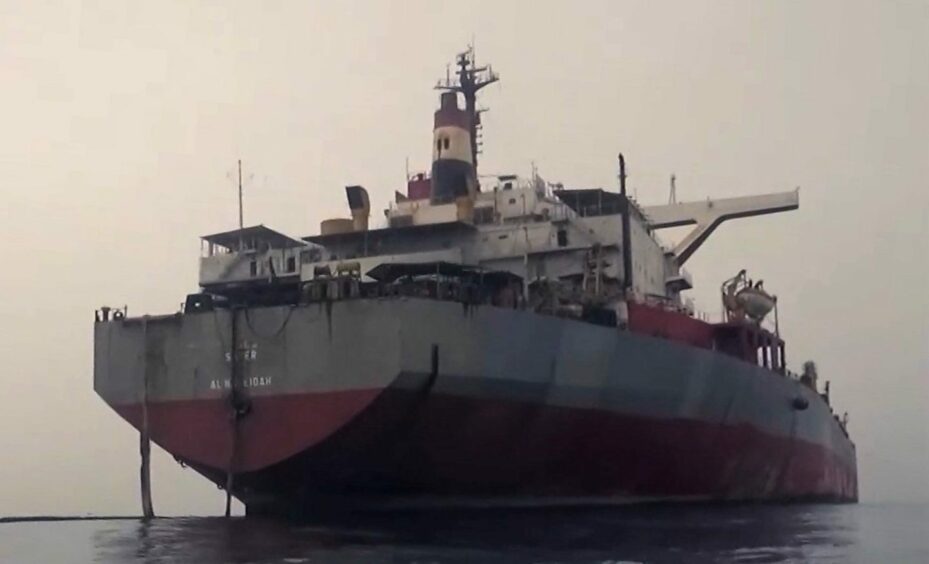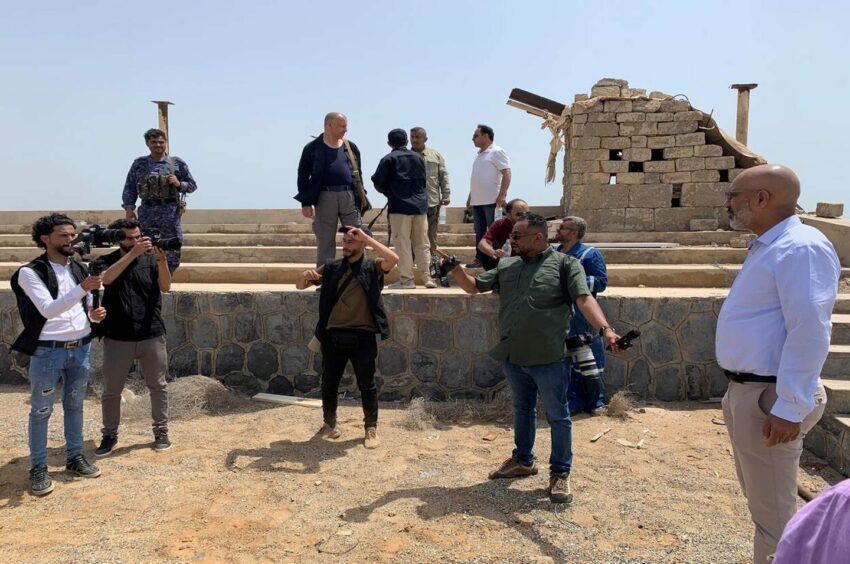
The United Nations has begun securing funding commitments to tackle the dangers posed by the FSO Safer, offshore Yemen.
The ageing vessel holds around 1 million barrels of crude. Maintenance has lapsed and the ship is in danger of causing an oil spill that would have substantial economic and environmental impact around the Red Sea.
The UN and Netherlands are overseeing the pledging event today. Cleaning up the oil spill might cost $20 billon.
Costs to tackle the problem now are $144 million.
The FSO Safer poses an “imminent threat”, the UN representative to Yemen, David Gressly, said. The UN plan is viable, he said, but it “will not succeed without urgent funding”.
Pledges appear to have fallen short, according to Khalida Bouzar, Assistant Secretary-General and Director of the UNDP for the region.
We are grateful to the donors who generously contributed around US$38 mil at #FSOSafer Pledging Conference today. W/ additional funding we can take urgent action to save the Red Sea, millions of lives as food can continue to be imported. We bring hope to #Yemeni people! pic.twitter.com/voDjjbMrmQ
— Khalida Bouzar (@khalida_bouzar) May 11, 2022
Greenpeace MENA reported the Netherlands, France, Finland, Germany, Qatar, Sweden, the UK and others committed “only half of the required US$80mn”.
The UK has pledged £4mn ($4.9mn) to the plan today, according to Minister of State for Asia and the Middle East Amanda Milling. Sweden pledged 30 million krona ($3mn). France has promised 1mn euros ($1.05mn), an amount matched by Finland. The Netherlands will put up 7.5 million euros ($7.9mn).
The US has spoken in support of the UN plan but it is not yet clear whether it will provide cash. Canada “is not in a position to provide funding”, according to comments made to CBC.
Gressly welcomed the pledges. He said he was looking forward to “receiving further commitments from those that have not yet pledged”.
Ghiwa Nakat, executive director at Greenpeace MENA, said countries “must put their money where their mouths are to ensure the oil on board the Safer is transferred to safety, swiftly and securely”.
Some countries have committed funds but it has not reached the full amount. “With each day the Safer situation deteriorates. As we wait for the funds to become available, it is crucial that oil spill response equipment such as containment booms be deployed in case of a spill and that communities are informed about the dangers.”
The Safer plan
There are two parts to the plan.
In the short term, a four month operation should tackle the immediate threat by transferring the crude to a safe temporary vessel. During this interim period, the FSO Safer and the temporary vessel would stay in place.
In the longer term, it would involve the installation of a replacement vessel – within 18 months – following the mobilisation of the resources. Once the permanent vessel is in place, the plan would involve the Safer being towed away to a yard for scrapping.
The UN aims to raise funds for both parts of the plan at the same time.
The first part of the plan would cost $80 million, the UN has said. This would cover the salvage work and the lease of a VLCC for 18 months. VLCC costs are currently low, making it a good time to find a ship.
On the clock
Gressly has said that the success of the plan hinges on securing funds swiftly in order “to begin work by the beginning of June”. If this window is missed, the start would have to be pushed back “several months, leaving this time bomb to continue to tick”.
Winds and currents will make operations too dangerous if it drags on beyond September or October. As weather conditions worsen, it increases the risk of a spill from the FSO.
The Netherlands’ Ministry of Foreign Affairs has said success would “depend on the willingness of Houthi rebels to co-operate”.
Dutch ambassador to Yemen Peter Derrek Hof has said support from the Houthis is the hardest part of the plan. “I’m hopeful the oil can be pumped out of the tanker by the end of the year. But it’s a tricky undertaking,” he said. Representatives from a Dutch company capable of transferring the oil accompanied Hof to Yemen.
An animation from Boskalis’ Smit unit demonstrates how the plan to transfer the Safer’s crude may take place.
The International Maritime Organisation (IMO) has supported the UN plan to tackle the FSO Safer problem. “I urge the full support” IMO secretary-general Kitack Lim said for the conference. “The time is now, the risk is high. We must act to avert danger.”
The UK has previously carried out studies on the FSO Safer.
Today, UK is attending Netherlands and UN hosted pledging event in the Hague to support the UN-coordinated plan to address the threat from the #FSOSafer. The plan has wide support but urgent funding is needed. This is a global issue and donors need to act now. pic.twitter.com/6gnCngj6zs
— BritishEmbassySanaa (@UKinYemen) May 11, 2022
Updated at 7:21 pm with overall figure and additional figures, plus comment from Greenpeace MENA.

 © Supplied by Netherlands Ministry
© Supplied by Netherlands Ministry